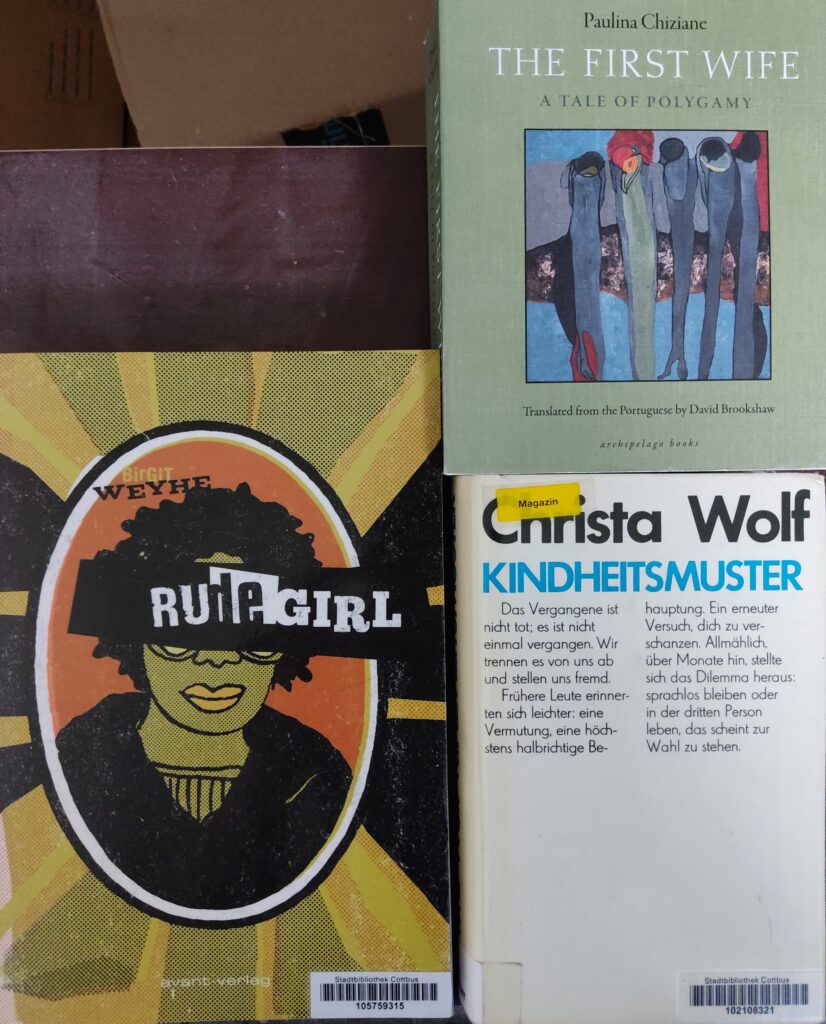I finished a modest eight books this month, four from my month’s project of “finishing off”, one reread in Portuguese, a modest two in German, and five by women/POC. And since it’s the middle of the year, that makes a total of 57 books, 23 in German, 31 by women/POC, seven in Portuguese (though that includes rereads).

- Raízes do amanhã — Waldson Souza et al.
- Vernon Subutex 1 — Virginie Despentes, tr. Frank Wynne
- Kindheitsmuster — Christa Wolf
- Moon Palace — Paul Auster
- The First Wife — Paulina Chiziane, tr. David Brookshaw
- Rude Girl — Birgit Weyhe
- Thomas Cromwell — Diarmaid MacCulloch
- Alle Toten fliegen hoch: Amerika — Joachim Meyerhoff
As with The Seagull last month, I read Vernon Subutex 1 as preparation for a trip to the theatre. The comparison was fascinating: the play gained a lot from the experience of the performance, especially as music and cinema are central themes, while the novel includes a large narrative element sacrificed in the adaptation. In both, there’s a fine balance between tragedy and comedy.
One particular advantage of the performance of Vernon Subutex was that Vernon was played by Joachim Meyerhoff, who I’d also seen in The Seagull. I enjoyed seeing how he could play both characters in very similar ways, with a particularly good comic style to his voice and timing. Having found out that he also writes, I listened to his reading of the first part of his autobiographical sequence, Alle Toten fliegen hoch: Amerika. The same manner made it a pleasure to listen to, and again there’s a balance between the bulk of the story (comic tales from his year in Laramie, Wyoming) and a central tragedy.
Star book of the month was undoubtedly Kindheitsmuster. It’s a big book in every sense: page count (hence the need to finish it off this month), but also the themes of the Wolf-like protagonist’s childhood in Nazi-era eastern Germany, and the author’s return on a visit to what has become Poland in the 70s. The narrative conceit is that the child is always referred to in the third person, and the author in the second; the book cannot be completed until she manages to reconcile the two in the first. What could be a formal gimmick turns out to be extremely effective.
I started listening to Moon Palace when Paul Auster died, and though I liked the beginning very much, got distracted by other projects. There are similarities with Kindheitsmuster: strong parallels between the author and narrator, and a strong overall form. In this case the form is provided by various strokes of fate, which strike in Dickensian style, which I found rather alienating, but there are still plenty of wonderful things in the novel (the protagonist reading through his furniture made from crates of books, and the description of a trip to see a painting, in particular).
I’ve been reading Diarmaid MacCulloch’s biography of Thomas Cromwell for more than a year — I unwisely chose to read it in the kindle app on my phone, which wasn’t conducive to getting immersed in it. In the meantime I’ve finished Hilary Mantel’s trilogy, which helped as a reference point as I reached the final stages of Cromwell’s career (normally it might go the other way). After the long struggle, once I’d started to make progress it all went much more smoothly. As a book, it wasn’t the easiest read — inevitably there’s a large cast involved, which was not easy to keep track of, though the author helpfully points out when we’ve met someone before. The occasional flashes of humour were also very welcome.
With the last finished-off book, we turn to Black and Portuguese writing: The First Wife is an engrossing story of polygamy in Mozambique. Chiziane’s style is very florid, with similes piled on similes — not completely my thing, but it certainly creates an effect. Some of the details of Mozambican marital culture were also eye-opening.
My Portuguese re-read — and first Portuguese audiobook — was Raízes do amanhã, a collection of Brazilian Afro-futurist stories. Not all great writing, but fun.
Finally, graphic novel of the month was Rude Girl, which was unlike anything I’d read before. Enclosed in a framing story of how Weyhe came to write the book is a fictionalised biography of a Caribbean girl in Chicago, who copes with racism, abuse and poverty while embracing literature and the skinhead movement and eventually moving to Germany. It’s intercut with her own reflections on Weyhe’s retelling — as told by Weyhe.
Coming up: I’m starting the second half of 2024 with Ireland, plus (hopefully) a Thomas Mann mini-project….
